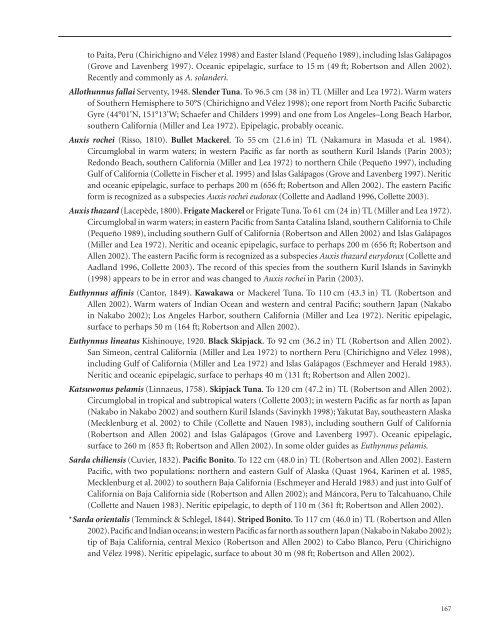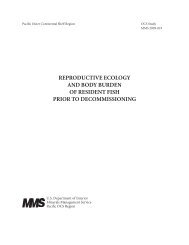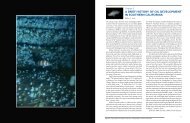checklist (pdf) - The Love Lab - University of California, Santa Barbara
checklist (pdf) - The Love Lab - University of California, Santa Barbara
checklist (pdf) - The Love Lab - University of California, Santa Barbara
Create successful ePaper yourself
Turn your PDF publications into a flip-book with our unique Google optimized e-Paper software.
to Paita, Peru (Chirichigno and Vélez 1998) and Easter Island (Pequeño 1989), including Islas Galápagos<br />
(Grove and Lavenberg 1997). Oceanic epipelagic, surface to 15 m (49 ft; Robertson and Allen 2002).<br />
Recently and commonly as A. solanderi.<br />
Allothunnus fallai Serventy, 1948. Slender Tuna. To 96.5 cm (38 in) TL (Miller and Lea 1972). Warm waters<br />
<strong>of</strong> Southern Hemisphere to 50°S (Chirichigno and Vélez 1998); one report from North Pacific Subarctic<br />
Gyre (44°01'N, 151°13'W; Schaefer and Childers 1999) and one from Los Angeles–Long Beach Harbor,<br />
southern <strong>California</strong> (Miller and Lea 1972). Epipelagic, probably oceanic.<br />
Auxis rochei (Risso, 1810). Bullet Mackerel. To 55 cm (21.6 in) TL (Nakamura in Masuda et al. 1984).<br />
Circumglobal in warm waters; in western Pacific as far north as southern Kuril Islands (Parin 2003);<br />
Redondo Beach, southern <strong>California</strong> (Miller and Lea 1972) to northern Chile (Pequeño 1997), including<br />
Gulf <strong>of</strong> <strong>California</strong> (Collette in Fischer et al. 1995) and Islas Galápagos (Grove and Lavenberg 1997). Neritic<br />
and oceanic epipelagic, surface to perhaps 200 m (656 ft; Robertson and Allen 2002). <strong>The</strong> eastern Pacific<br />
form is recognized as a subspecies Auxis rochei eudorax (Collette and Aadland 1996, Collette 2003).<br />
Auxis thazard (Lacepède, 1800). Frigate Mackerel or Frigate Tuna. To 61 cm (24 in) TL (Miller and Lea 1972).<br />
Circumglobal in warm waters; in eastern Pacific from <strong>Santa</strong> Catalina Island, southern <strong>California</strong> to Chile<br />
(Pequeño 1989), including southern Gulf <strong>of</strong> <strong>California</strong> (Robertson and Allen 2002) and Islas Galápagos<br />
(Miller and Lea 1972). Neritic and oceanic epipelagic, surface to perhaps 200 m (656 ft; Robertson and<br />
Allen 2002). <strong>The</strong> eastern Pacific form is recognized as a subspecies Auxis thazard eurydorax (Collette and<br />
Aadland 1996, Collette 2003). <strong>The</strong> record <strong>of</strong> this species from the southern Kuril Islands in Savinykh<br />
(1998) appears to be in error and was changed to Auxis rochei in Parin (2003).<br />
Euthynnus affinis (Cantor, 1849). Kawakawa or Mackerel Tuna. To 110 cm (43.3 in) TL (Robertson and<br />
Allen 2002). Warm waters <strong>of</strong> Indian Ocean and western and central Pacific; southern Japan (Nakabo<br />
in Nakabo 2002); Los Angeles Harbor, southern <strong>California</strong> (Miller and Lea 1972). Neritic epipelagic,<br />
surface to perhaps 50 m (164 ft; Robertson and Allen 2002).<br />
Euthynnus lineatus Kishinouye, 1920. Black Skipjack. To 92 cm (36.2 in) TL (Robertson and Allen 2002).<br />
San Simeon, central <strong>California</strong> (Miller and Lea 1972) to northern Peru (Chirichigno and Vélez 1998),<br />
including Gulf <strong>of</strong> <strong>California</strong> (Miller and Lea 1972) and Islas Galápagos (Eschmeyer and Herald 1983).<br />
Neritic and oceanic epipelagic, surface to perhaps 40 m (131 ft; Robertson and Allen 2002).<br />
Katsuwonus pelamis (Linnaeus, 1758). Skipjack Tuna. To 120 cm (47.2 in) TL (Robertson and Allen 2002).<br />
Circumglobal in tropical and subtropical waters (Collette 2003); in western Pacific as far north as Japan<br />
(Nakabo in Nakabo 2002) and southern Kuril Islands (Savinykh 1998); Yakutat Bay, southeastern Alaska<br />
(Mecklenburg et al. 2002) to Chile (Collette and Nauen 1983), including southern Gulf <strong>of</strong> <strong>California</strong><br />
(Robertson and Allen 2002) and Islas Galápagos (Grove and Lavenberg 1997). Oceanic epipelagic,<br />
surface to 260 m (853 ft; Robertson and Allen 2002). In some older guides as Euthynnus pelamis.<br />
Sarda chiliensis (Cuvier, 1832). Pacific Bonito. To 122 cm (48.0 in) TL (Robertson and Allen 2002). Eastern<br />
Pacific, with two populations: northern and eastern Gulf <strong>of</strong> Alaska (Quast 1964, Karinen et al. 1985,<br />
Mecklenburg et al. 2002) to southern Baja <strong>California</strong> (Eschmeyer and Herald 1983) and just into Gulf <strong>of</strong><br />
<strong>California</strong> on Baja <strong>California</strong> side (Robertson and Allen 2002); and Máncora, Peru to Talcahuano, Chile<br />
(Collette and Nauen 1983). Neritic epipelagic, to depth <strong>of</strong> 110 m (361 ft; Robertson and Allen 2002).<br />
*Sarda orientalis (Temminck & Schlegel, 1844). Striped Bonito. To 117 cm (46.0 in) TL (Robertson and Allen<br />
2002). Pacific and Indian oceans; in western Pacific as far north as southern Japan (Nakabo in Nakabo 2002);<br />
tip <strong>of</strong> Baja <strong>California</strong>, central Mexico (Robertson and Allen 2002) to Cabo Blanco, Peru (Chirichigno<br />
and Vélez 1998). Neritic epipelagic, surface to about 30 m (98 ft; Robertson and Allen 2002).<br />
167




